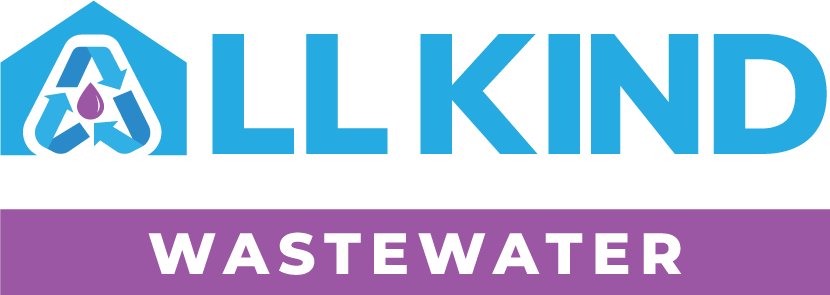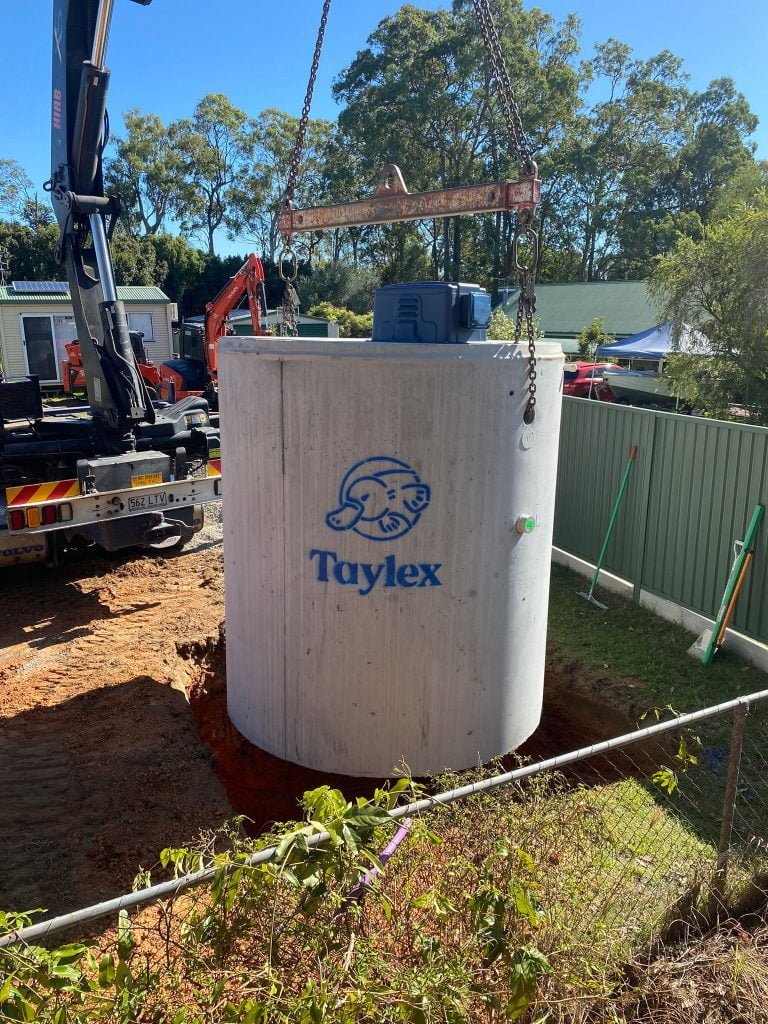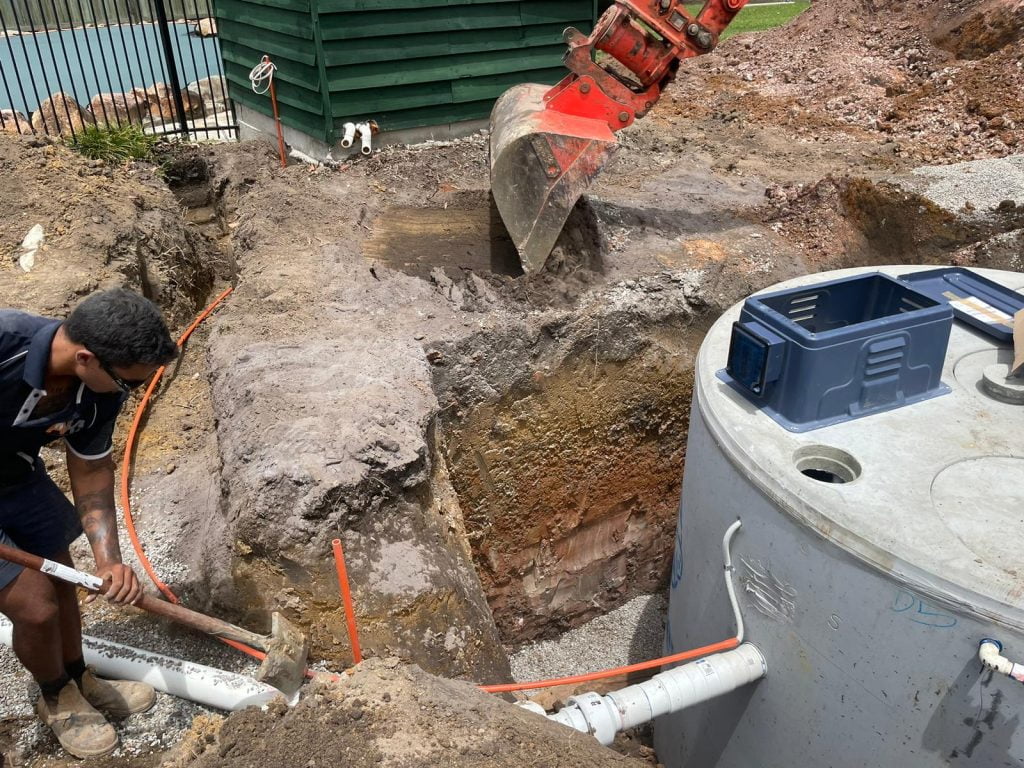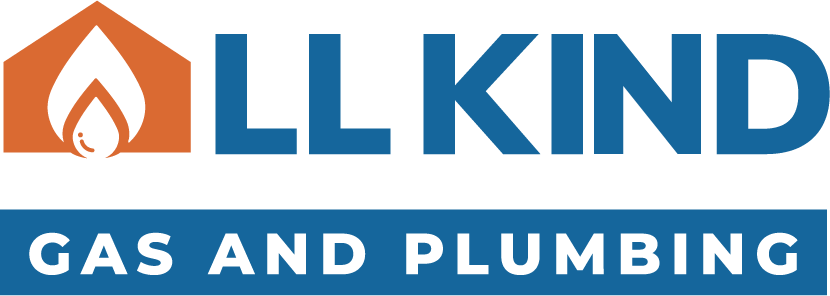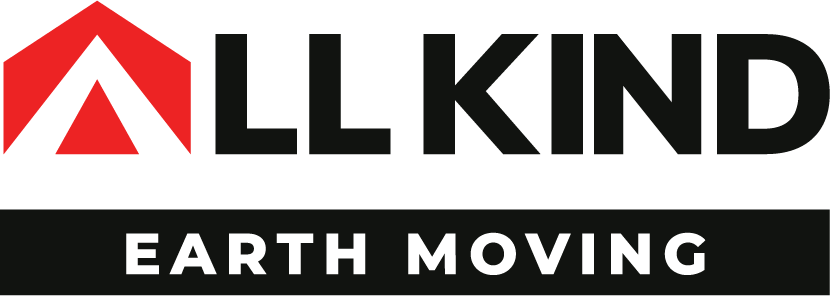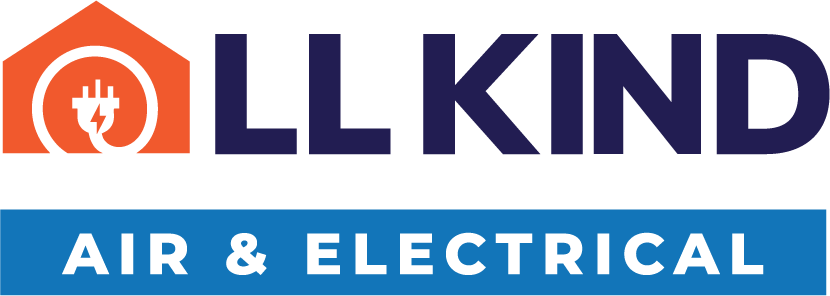The Difference Between Sewage & Sewerage
In wastewater management, “sewage” and “sewerage” are often used interchangeably, leading to confusion. However, these two concepts are distinct and understanding their difference is crucial for proper waste handling and environmental protection. Sewage refers to the waste matter carried away from residential and commercial properties, comprising human waste and household wastewater. On the other hand, sewerage describes the intricate system designed to collect, transport, and ultimately treat this sewage.
A well-designed sewerage system typically consists of an extensive network of pipes, pumps, and treatment plants that work together to ensure the safe and efficient removal of sewage from our homes and communities. It is essential to differentiate between sewage and sewerage to avoid misunderstandings and improper waste management practices, potentially causing environmental damage and public health concerns.
This guide aims to clarify the sewage-sewerage distinction, exploring the nuances of each concept and their respective roles in the broader wastewater management process. By understanding this crucial difference, individuals and communities can make informed decisions and take appropriate actions to maintain a clean and healthy living environment.
What is Sewage?
Sewage is waste carried away from residential and commercial properties through a dedicated drainage system. It is a complex mixture comprising human waste from toilets, greywater from sinks, showers, and washing machines, and other liquid or semi-solid waste generated by households and businesses.
Sewage’s composition can vary depending on the source, but it typically contains a high concentration of organic matter, nutrients, pathogens, and various contaminants. Human waste, including fecal matter and urine, forms a significant component of sewage and poses a potential health risk if not properly treated and disposed of.
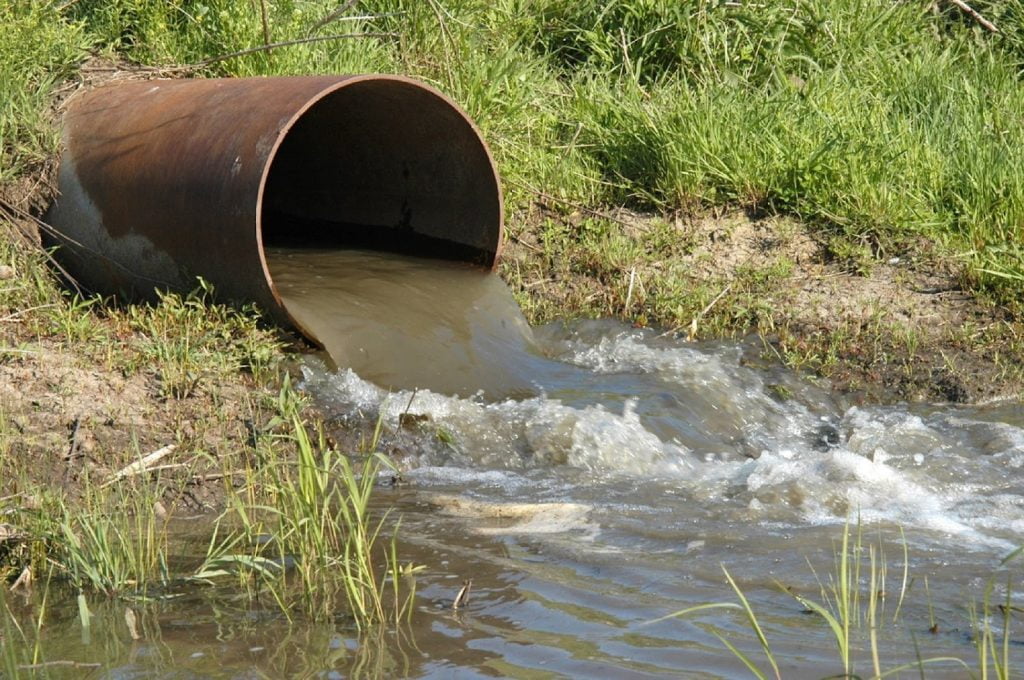

Untreated sewage can contaminate water sources, spread waterborne diseases, and cause significant ecological harm. To avoid these risks, sewage must undergo a comprehensive treatment process to remove harmful substances and reduce its pollutant load before being released into the environment.
Sewage treatment plants play a crucial role in handling and treating sewage. These facilities employ physical, chemical, and biological processes to remove solid waste, break down organic matter, and disinfect the wastewater. The treated effluent is then discharged into natural water bodies or reused for non-potable purposes, such as irrigation or industrial processes.
Effective sewage management also involves appropriately operating and maintaining pumping stations and overflow prevention mechanisms to ensure the smooth flow of waste and prevent backups or overflows, which can lead to localised flooding and environmental contamination.
What is Sewerage?
Sewerage refers to the intricate system designed to collect and transport sewage from its source to a treatment facility. This vital infrastructure plays a crucial role in maintaining public health and environmental protection by ensuring the proper handling and treatment of wastewater.
A typical sewerage system comprises a network of underground sewer pipes, manholes, pumping stations, and treatment facilities. These components work together to convey sewage from homes, businesses, and other sources to a centralised location for treatment.
It’s important to differentiate between sewerage and stormwater drainage systems. While sewerage systems are designed to handle sewage and wastewater, stormwater drainage systems are separate networks that collect and divert rainwater and surface runoff to prevent flooding and pollution.
In some older cities, combined sewer systems collected sewage and stormwater in the same pipes. However, these systems are gradually being phased out due to the potential for overflows during heavy rainfall, which can lead to the discharge of untreated sewage into waterways.
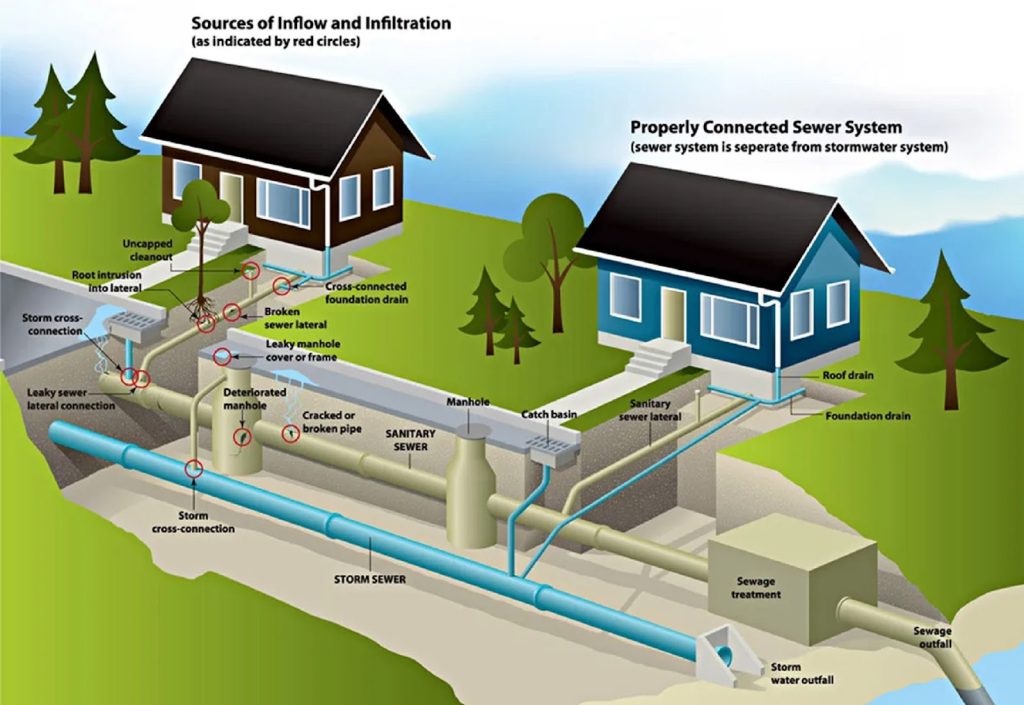

A well-maintained sewerage system is essential for protecting public health and the environment. Properly functioning sewerage infrastructure prevents the contamination of water sources, soil, and air by ensuring that sewage is collected, transported, and treated effectively before being released back into the environment.
Regular maintenance, inspections, and upgrades are crucial to ensure the sewerage system operates efficiently and minimises the risk of blockages, leaks, or overflows. Neglecting sewerage system maintenance can lead to sewage backups, property damage, and the potential spread of waterborne diseases.
Sewerage systems play a vital role in modern sanitation and wastewater management. They work in tandem with sewage treatment facilities to treat the sewage collected from homes and businesses through various physical, chemical, and biological treatment processes.
The Crucial Difference Between Sewage and Sewerage
To illustrate the difference in practical contexts, consider a residential property with a septic tank. The household’s sewage is the waste matter itself. At the same time, the septic tank and associated piping constitute the on-site sewerage system responsible for collecting and treating the sewage locally.
In a reticulated sewerage system, the sewage from homes and businesses is collected through a network of underground pipes, known as the sewer system or the system of sewers. This infrastructure transports the sewage to a centralised treatment facility, where it undergoes various treatment processes to remove organic matter, contaminants, and pathogens before being discharged as treated effluent into water bodies or used for non-potable purposes.
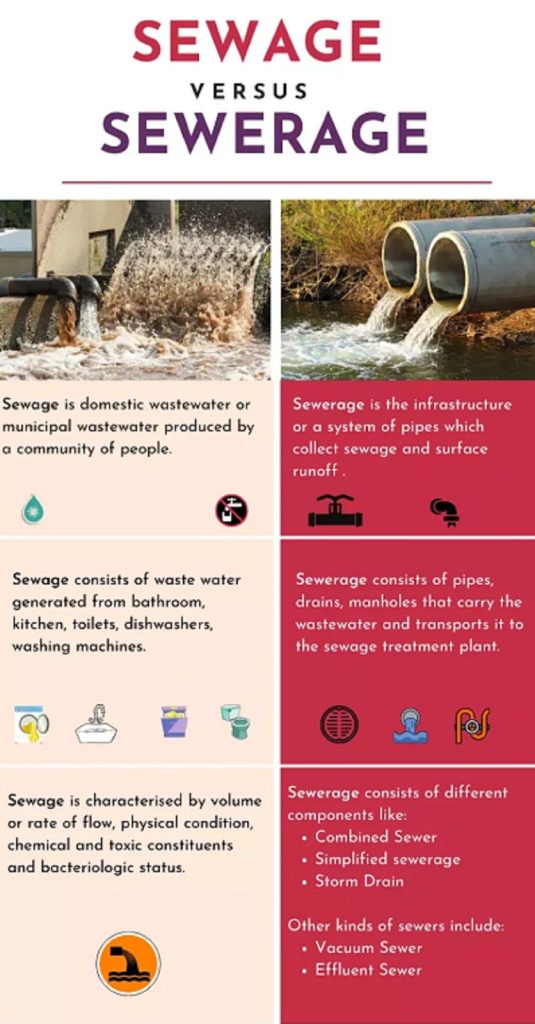

Failing to differentiate between sewage and sewerage can have severe consequences, such as improper waste disposal, system overloads, and environmental pollution. For instance, mistakenly discharging sewage into stormwater drainage systems can contaminate waterways and pose significant health risks. Similarly, if sewerage systems are overwhelmed due to mismanagement or inadequate maintenance, sanitary sewer overflows can release untreated sewage into the environment.
Clearly understanding the distinction between sewage (the waste matter) and sewerage (the transportation system), professionals, policymakers, and the general public can make informed decisions and take appropriate actions to ensure the proper handling, treatment, and disposal of wastewater, ultimately safeguarding public health and the environment.
The Sewage Treatment Process
Once sewage is collected and transported through the sewerage system, it undergoes a comprehensive treatment process to remove contaminants and make the wastewater safe for release into the environment. This process typically occurs at sewage treatment plants and involves multiple stages:
- Preliminary Treatment: This initial stage involves removing large solid objects, such as rags, sticks, and debris, through screening and grit removal processes.
- Primary Treatment: During this phase, heavier solids can settle in sedimentation tanks, while lighter materials like oils and greases are skimmed off the surface.
- Secondary Treatment: This stage employs biological processes, where microorganisms break down and consume the wastewater’s remaining organic matter and nutrients.
- Tertiary Treatment: Depending on the intended use of the treated effluent, additional processes like filtration, disinfection, and advanced treatment techniques may be employed to purify the water further.
Sewage treatment plants play a vital role in removing contaminants, pathogens, and harmful substances from the wastewater, ensuring it meets strict environmental standards before being discharged or reused. Proper sewage treatment is essential for protecting public health by preventing the spread of waterborne diseases and safeguarding the integrity of natural water bodies and ecosystems.
Failure to properly treat sewage can lead to severe environmental degradation, contamination of water sources, and potential health hazards for communities relying on these resources. Thus, investing in adequate sewage treatment infrastructure and adhering to rigorous treatment processes is crucial for maintaining a clean and sustainable environment.
Maintaining Sewerage Systems
Regular maintenance and inspections of sewerage systems are crucial to ensure their efficient operation and prevent potential issues that could lead to environmental pollution and public health risks. Neglecting sewerage system maintenance can result in blockages, overflows, and the discharge of untreated sewage into the natural water cycle.
Domestic sewage from homes and businesses must be effectively transported away through the system of pipes to treatment facilities. If blockages occur or the system’s capacity is exceeded, sewage may back up and overflow, leading to localised flooding and water pollution.
Professional services play a vital role in ensuring the proper function of sewerage systems. Their expertise includes conducting regular inspections, identifying potential issues, and implementing preventative maintenance measures. Addressing these issues minimise the risk of sewage overflows and the associated environmental and health consequences.
Maintaining the overall integrity of sewerage infrastructure, extending its lifespan and preventing costly repairs or replacements due to neglect or system failures. Investing in professional sewerage system maintenance is essential for safeguarding public health and preserving the natural environment.
Protect Your Community By Trusting the Sewage Experts
Understanding the distinction between sewage and sewerage is vital for effective wastewater management and environmental protection. Failure to differentiate these concepts can lead to misunderstandings, improper waste disposal, and potential health hazards.
If you have any concerns or requirements related to sewage or sewerage systems, seek professional assistance from septic tank experts. Their knowledgeable team has extensive experience providing comprehensive solutions for residential and commercial properties in Brisbane, Sunshine Coast, Moreton Bay and the Gold Coast.
Contact All Kind Waste Water via email, schedule an appointment, or call them today. Trust their expertise to ensure the proper handling of sewage, maintain the integrity of your sewerage system, and contribute to a cleaner, healthier community.
